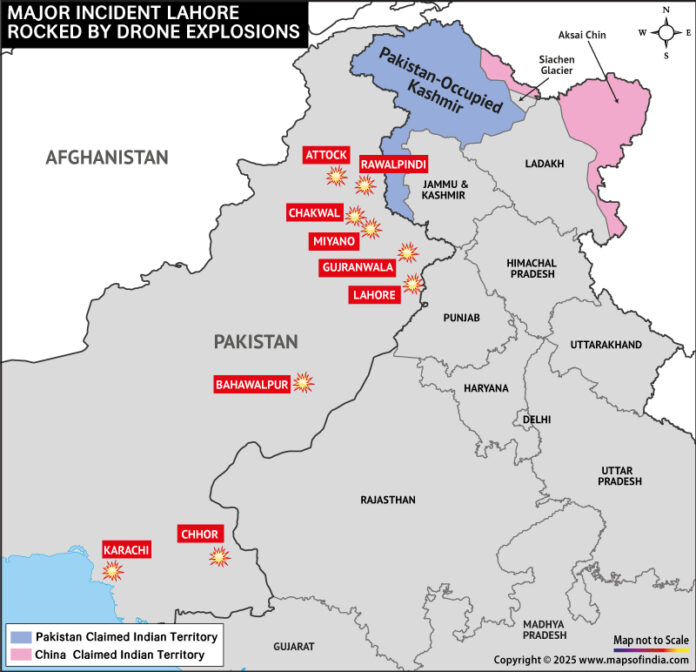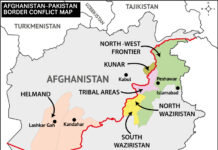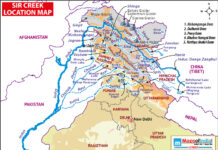
Lahore, Pakistan — A succession of strong blasts jolted the eastern Pakistani city of Lahore early Thursday dawn, May 8, 2025, boosting already upgraded tensions between India and Pakistan. As emergency bands shuffled to manage the crisis and evaluate the damage, Pakistan’s army alleged the aggression was the result of targeted drone strikes by India, a declaration that, if substantiated, signals a risky new stage in the escalating South Asian conflict.
Record of the Attack
According to initial information from regional leaders, three main blasts were heard near Walton Road in Lahore at 4:15 AM local time. The zone, which contains both residential unions and key infrastructure, was fast cordoned off as crisis services answered.
Observers defined scenes of chaos: sirens screaming, shattered glass, and plumes of steam rising into the sky. Several networks suffered structural damage, while power outages disrupted transmission and public utilities in nearby areas.
“We heard a loud blast that shook our entire apartment building,” said Farooq Ahmed, a resident of the area. “People ran out into the streets in panic. Many thought it was an earthquake at first — that’s how powerful it was.”
The Pakistani Inter-Services Public Relations (ISPR) confirmed that at least one of the blasts was the result of a drone strike near a naval facility in Lahore, leading to the death of one civilian and injuries to four military personnel. Other explosions, authorities say, are still under forensic investigation but are “highly likely” to be part of a coordinated offensive.
Military and Political Fallout
Within hours of the incident, Pakistan’s Ministry of Defence issued a stern condemnation, blaming India for what it described as “an act of blatant aggression” and “a violation of Pakistan’s sovereignty.” The Foreign Office claimed that Indian drones had breached Pakistani airspace and targeted both military and civilian sites, leading to a series of retaliatory defensive operations.
“The Indian military’s actions this morning constitute a serious provocation and a breach of international law,” said Foreign Office spokesperson Mumtaz Zahra Baloch in a press conference. “We reserve the right to respond at a time and manner of our choosing.”
Pakistan also claimed to have downed 12 Indian drones in various regions bordering Punjab and Kashmir over the last 24 hours — a claim India has not independently confirmed.
India’s Silence and Regional Repercussions
As of publication, the Indian government has not officially responded to Pakistan’s allegations. However, Indian military analysts have hinted that the operation could be part of the broader “Operation Sindoor” — a targeted campaign launched by New Delhi following the deadly Pahalgam attack on April 30, in which 26 Indian civilians, mostly Hindu pilgrims, were killed.
India has accused the Pahalgam attack on Jaish-e-Mohammed (Jem), a Pakistan-based militant group. In response, India vowed strong retaliatory action and claimed to have neutralised several terror camps across the border through precision strikes in the following days.
If confirmed, the Lahore happening marks the sooner major walkout in-depth within Pakistani territory during this recent standoff, significantly increasing the stakes and drawing comparisons to the 2019 Balakot attacks, another flashpoint in the two nations’ rugged record.
Flight Operations Suspended, Panic in the Streets
As worries of other attacks loomed, Lahore’s Allama Iqbal International Airport suspended all flight processes indefinitely. Trained and global flights were cancelled or rerouted to other airports, causing trouble across Pakistan’s flight sector.
Passengers stranded at the airport transmitted videos on social media showing long queues, confusion, and a heavy security presence. The Civil Aviation Authority issued a statement urging travellers to stay home unless required and confirmed that updates would be provided as the situation developed.
In the city itself, police and paramilitary forces have been deployed at sensitive locations. Schools, colleges, and public offices were closed for the day, and citizens were advised to stay indoors.
International Reaction and Call for De-escalation
The global society reacted swiftly to the happening, with several countries demanding that both India and Pakistan exercise restraint and avoid further instigation.
Iran, which shares borders with both countries and has historically maintained diplomatic relations with both, offered to mediate in an attempt to de-escalate tensions. “We call on our neighbours to resolve their disputes through dialogue and mutual understanding,” said Iranian Foreign Minister Hossein Amir-Abdollahian in Tehran.
The United Nations also stated that Secretary-General António Guterres called for calm and offered to facilitate peace talks. “Any escalation between nuclear-armed conditions poses a serious risk to provincial and global peace,” the report read.
The United States, China, and the European Union echoed equal beliefs, urging both sides to refrain from unilateral military actions and prioritise diplomacy.
Public Response and Domestic Ramifications
In Lahore and other parts of Pakistan, the incident has sparked public anger and fear. Citizens took to the streets in unplanned demonstrations, chanting slogans against the Indian attack and requiring a strong response from Islamabad.
Political parties across Pakistan united in censuring the aggression. The opponent Pakistan Muslim League-Nawaz (PML-N) called for a crisis session of parliament, while the Pakistan Tehreek-e-Insaf (PTI) management promised full consent to the army in guarding the nation’s power.
“This is not just an attack on Lahore — it’s an attack on the dignity of every Pakistani,” said PTI spokesperson Fawad Chaudhry. We will not be cowed into silence or capitulation.”
Human rights groups, meanwhile, have advised both countries to ensure the safety of civilians and avoid further escalation that could lead to mass deaths or removal.
Wider Implications and Strategic Calculations
The Lahore incident raises deep inquiries about the course of India-Pakistan relations in 2025. With both countries having experienced administrative changes in recent years and restricted dynamics turning due to global power realignments, analysts warn that the current crisis could spiral out of control without timely intervention.
“It’s clear we’re entering a new chapter in South Asian geopolitics,” said Dr. Farzana Shaikh, a senior fellow at Chatham House. “The willingness to carry out strikes deep inside each other’s territory, combined with the rhetoric on both sides, shows a level of brinkmanship not seen since the Kargil conflict of 1999.”
Others point to the increasing use of drone warfare as a game-changer. Unlike conventional airstrikes, drones offer plausible deniability, low operational risk, and strategic surprise — but also heighten the potential for miscalculation and civilian casualties.



